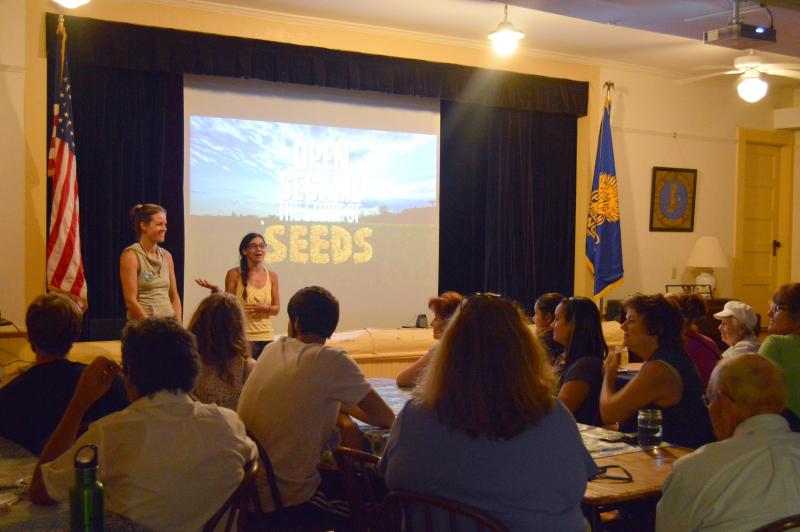GMO labeling group hopes to plant seeds of change
While the use of genetically modified organisms (GMOs) remains a divisive issue, there’s one group in Massachusetts taking a strong stance against their use.
This weekend, a group of about 60 gathered at the Dartmouth Grange for a viewing of the documentary, “Open Sesame: The Story of Seeds.” The film suggests that the biodiversity of seeds is in steep decline because seeds are sourced through a small number of companies.
The film was brought to the Grange by MA Right to Know GMOs, which is a member of the national coalition, Citizens for GMO Labeling. Rebecca Peters of MA Right to Know GMOs said her group travels around the state to raise awareness of the lack of GMO labeling on food products.
Genetically modified organisms, whereby the genetic material of a living organism is altered in a lab through genetic engineering, has remained controversial since the technology was developed in the 1980s.
Supporters argue that the use of genetically modified crops will help sustain and feed Earth’s ever increasing population by lowering the cost of food. Detractors argue that the safety of such crops is unclear.
The film takes a sharp stance against Monsanto, an American company famed for being one of the first to genetically modify plant cells. Monsanto’s use of biological patents is a point of contention in the film as it’s linked to the rise of genetically modified organisms in the American food supply and the decline of biodiversity in plant life.
“[The crops] are generally created to withstand heavy pesticide use. And then they put those seeds out into the public with very little known about their environmental impacts or their safety,” said Peters.
“In the ideal world, they would take them out of the food supply until they can prove without a doubt that there’s no negative impact,” she said. “But even just giving us the right to know that something we’re about to eat has [GMOs] in there is a good step.”
Peters said her group, which formed two years ago, has worked to draft a bill addressing the lack of GMO labeling, the Genetic Engineering Transparency Food and Seed Labeling Act (H.3242). If passed, manufacturers would be required to label a product that contains ingredients made with GMOs. A public hearing regarding the bill is scheduled for Sept. 22 at 1 p.m. at the Massachusetts State House in Boston.
She said that change can happen on a smaller scale, too. A large portion of the documentary dealt with those invested in “seed saving,” a long-used method of selecting the best crops and reusing seeds from those particular plants.
Bill Braun, a farmer from Westport who was in attendance, started his own seed project at Ivory Silo Farm.
“Seed saving is what we’ve done for thousands of years but lost sight of recently,” said Braun. “Basically, seed saving is going into your field or garden and selecting the best of the best and letting the plant go through its entire life to put seed out and saving that seed to replant it.”
He said modern farming typically involves a farmer flipping through a catalog in the winter to search for next year’s seeds. But many of those seeds have origins from around the world and may not be suitable to the climate where the farmer lives.
With seed saving, farmers are given the chance to select the produce that did the best on their own farm. By propagating those plants, he said, farmers will end up growing plants that have already adapted to the land.
“It’s not anything new. Seed saving is basically just continuing the process of stewarding our food supply,” said Braun. “By saving our own seeds, we’re ensuring better varieties for next year and varieties that don’t depend on heavy amounts of fertilizers and water.”














